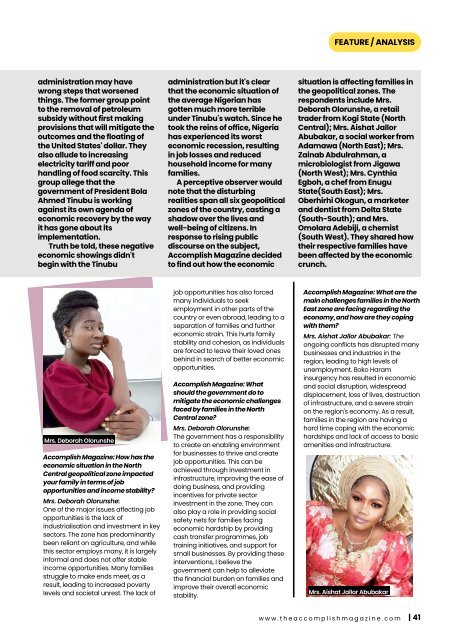ACCOMPLISH MAGAZINE APRIL 2024
April edition with Tomi Davies, Africa's Top Angel, on the cover and other stories.
April edition with Tomi Davies, Africa's Top Angel, on the cover and other stories.
Create successful ePaper yourself
Turn your PDF publications into a flip-book with our unique Google optimized e-Paper software.
FEATURE / ANALYSIS<br />
administration may have<br />
wrong steps that worsened<br />
things. The former group point<br />
to the removal of petroleum<br />
subsidy without first making<br />
provisions that will mitigate the<br />
outcomes and the floating of<br />
the United States' dollar. They<br />
also allude to increasing<br />
electricity tariff and poor<br />
handling of food scarcity. This<br />
group allege that the<br />
government of President Bola<br />
Ahmed Tinubu is working<br />
against its own agenda of<br />
economic recovery by the way<br />
it has gone about its<br />
implementation.<br />
Truth be told, these negative<br />
economic showings didn't<br />
begin with the Tinubu<br />
administration but it's clear<br />
that the economic situation of<br />
the average Nigerian has<br />
gotten much more terrible<br />
under Tinubu's watch. Since he<br />
took the reins of office, Nigeria<br />
has experienced its worst<br />
economic recession, resulting<br />
in job losses and reduced<br />
household income for many<br />
families.<br />
A perceptive observer would<br />
note that the disturbing<br />
realities span all six geopolitical<br />
zones of the country, casting a<br />
shadow over the lives and<br />
well-being of citizens. In<br />
response to rising public<br />
discourse on the subject,<br />
Accomplish Magazine decided<br />
to find out how the economic<br />
situation is affecting families in<br />
the geopolitical zones. The<br />
respondents include Mrs.<br />
Deborah Olorunshe, a retail<br />
trader from Kogi State (North<br />
Central); Mrs. Aishat Jallor<br />
Abubakar, a social worker from<br />
Adamawa (North East); Mrs.<br />
Zainab Abdulrahman, a<br />
microbiologist from Jigawa<br />
(North West); Mrs. Cynthia<br />
Egboh, a chef from Enugu<br />
State(South East); Mrs.<br />
Oberhirhi Okogun, a marketer<br />
and dentist from Delta State<br />
(South-South); and Mrs.<br />
Omolara Adebiji, a chemist<br />
(South West). They shared how<br />
their respective families have<br />
been affected by the economic<br />
crunch.<br />
Mrs. Deborah Olorunshe<br />
Accomplish Magazine: How has the<br />
economic situation in the North<br />
Central geopolitical zone impacted<br />
your family in terms of job<br />
opportunities and income stability?<br />
Mrs. Deborah Olorunshe:<br />
One of the major issues affecting job<br />
opportunities is the lack of<br />
industrialisation and investment in key<br />
sectors. The zone has predominantly<br />
been reliant on agriculture, and while<br />
this sector employs many, it is largely<br />
informal and does not offer stable<br />
income opportunities. Many families<br />
struggle to make ends meet, as a<br />
result, leading to increased poverty<br />
levels and societal unrest. The lack of<br />
job opportunities has also forced<br />
many individuals to seek<br />
employment in other parts of the<br />
country or even abroad, leading to a<br />
separation of families and further<br />
economic strain. This hurts family<br />
stability and cohesion, as individuals<br />
are forced to leave their loved ones<br />
behind in search of better economic<br />
opportunities.<br />
Accomplish Magazine: What<br />
should the government do to<br />
mitigate the economic challenges<br />
faced by families in the North<br />
Central zone?<br />
Mrs. Deborah Olorunshe:<br />
The government has a responsibility<br />
to create an enabling environment<br />
for businesses to thrive and create<br />
job opportunities. This can be<br />
achieved through investment in<br />
infrastructure, improving the ease of<br />
doing business, and providing<br />
incentives for private sector<br />
investment in the zone. They can<br />
also play a role in providing social<br />
safety nets for families facing<br />
economic hardship by providing<br />
cash transfer programmes, job<br />
training initiatives, and support for<br />
small businesses. By providing these<br />
interventions, I believe the<br />
government can help to alleviate<br />
the financial burden on families and<br />
improve their overall economic<br />
stability.<br />
Accomplish Magazine: What are the<br />
main challenges families in the North<br />
East zone are facing regarding the<br />
economy, and how are they coping<br />
with them?<br />
Mrs. Aishat Jallor Abubakar: The<br />
ongoing conflicts has disrupted many<br />
businesses and industries in the<br />
region, leading to high levels of<br />
unemployment. Boko Haram<br />
insurgency has resulted in economic<br />
and social disruption, widespread<br />
displacement, loss of lives, destruction<br />
of infrastructure, and a severe strain<br />
on the region's economy. As a result,<br />
families in the region are having a<br />
hard time coping with the economic<br />
hardships and lack of access to basic<br />
amenities and infrastructure.<br />
Mrs. Aishat Jallor Abubakar<br />
www.theaccomplishmagazine.com<br />
| 41

















